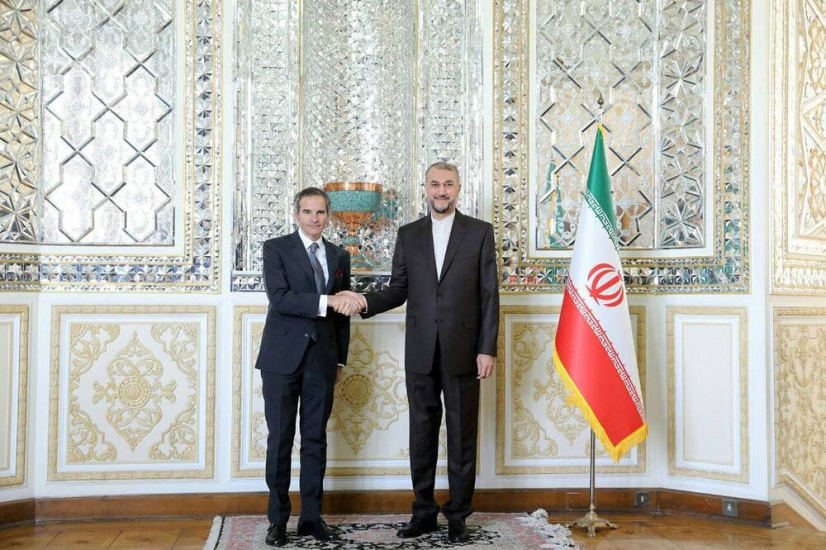’IAEA chief meets Iran FM, stresses finding ‘creative solutions

Rafael Grossi, Director General of the IAEA, traveled to Tehran for technical talks with the officials of the Atomic Energy Organization of Iran (AEOI).
During the meeting, the Iranian top diplomat stressed the need for an independent, professional and impartial approach by the IAEA, and the importance of strengthening the agency's relations and cooperation with Iran in areas beyond oversight and inspection, including supporting Iran's peaceful nuclear industry.
Amir Abdollahian also expressed hope that the negotiations and understandings between the IAEA and AEOI will pave the way for the implementation of agreements more than ever before.
In the meeting, Iran’s foreign minister also referred to the role of the Israeli regime in creating discord and crisis and drew the attention of the IAEA chief to the regime’s abuse of the mechanisms of the agency.
Amir Abdollahian expressed hope that during the visit of the IAEA chief, mutual trust and cooperation between the two sides will be strengthened.
For his part, Grossi underlined a technical and professional approach by the body under his leadership and stressed the need to strengthen relationship, cooperation and finding “creative solutions”.
He also underscored the IAEA's readiness to support joint projects for peaceful use of nuclear energy and described his visit to Iran as a sign of the will to hold dialogue, find common ground, resolve issues and enhance cooperation with Iran.
During the meeting, the two sides described the cooperation process between the IAEA and the AEOI as positive and successful.
Earlier on Saturday, Grossi met with Mohammad Eslami, Iran’s nuclear chief.
Eslami stated that he discussed with Grossi the outstanding issues raised by the IAEA chief in his earlier visits to Iran and those of Iranian officials to Vienna, and that they "reached a conclusion".
"It was resolved that the requisite documents will be exchanged between Iran and the IAEA" before the end of the Iranian month of Khordad, which falls on June 21, he added.
The remaining difficulties, according to Eslami, should be settled normally, and he hopes that "the new relationship and road we are constructing" with the agency would lead to Iran's progress.
"We hope that the collaboration process will be nonpolitical, and that the Iranian people will see the benefits in their daily life," he said.
"Political influence and lobbying should have no bearing on IAEA decisions."
Eslami added, "Iran and the IAEA should handle their concerns in a thoroughly professional manner and within the boundaries of their knowledge."
"Any political activity is out of question."
The nuclear deal talks in Vienna began in April after the administration of Joe Biden said the U.S. is willing to rejoin the JCPOA which was abandoned by his predecessor
Donald Trump under his “maximum pressure” policy against Iran.
Meanwhile, Grossi stated that he had been in regular contact with the Iranian nuclear chief, but that the two sides "did have a lot of critical concerns" that had not been handled for a long time and that they had now "agreed to try a practical, pragmatic approach" to settle them.
Grossi stated that the Vienna discussions and Iran-IAEA collaboration are intertwined, and that if Iran and the IAEA do not reach an agreement on safeguards problems, reaching an agreement in the Austrian capital will be difficult.
Grossi stated that he was committed to improving the IAEA's collaboration with Iran and assisting the Iranian people in their journey to prosperity.
"It is critical to reach a shared understanding in order to cooperate. Nuclear energy is critical for the growth of countries such as Iran."
Source: Tehran Times

